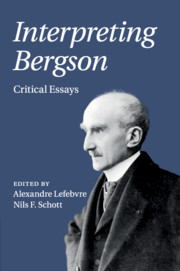Book contents
- Interpreting Bergson
- Interpreting Bergson
- Copyright page
- Contents
- Figures
- Contributors
- Abbreviations
- Introduction
- Chapter 1 Bergson’s Theory of Truth
- Chapter 2 What Was “Serious Philosophy” for the Young Bergson?
- Chapter 3 Bergson and Naturalism
- Chapter 4 Bergson on the True Intellect
- Chapter 5 Bergson’s Philosophy of Art
- Chapter 6 Bergson, the Time of Life, and the Memory of the Universe
- Chapter 7 Bergson and Philosophy as a Way of Life
- Chapter 8 Bergson and Social Theory
- Chapter 9 Bergson and Political Theory
- Chapter 10 Bergson, Colonialism, and Race
- Chapter 11 Bergson’s Philosophy of Religion
- Bibliography
- Index
Chapter 6 - Bergson, the Time of Life, and the Memory of the Universe
Published online by Cambridge University Press: 22 November 2019
- Interpreting Bergson
- Interpreting Bergson
- Copyright page
- Contents
- Figures
- Contributors
- Abbreviations
- Introduction
- Chapter 1 Bergson’s Theory of Truth
- Chapter 2 What Was “Serious Philosophy” for the Young Bergson?
- Chapter 3 Bergson and Naturalism
- Chapter 4 Bergson on the True Intellect
- Chapter 5 Bergson’s Philosophy of Art
- Chapter 6 Bergson, the Time of Life, and the Memory of the Universe
- Chapter 7 Bergson and Philosophy as a Way of Life
- Chapter 8 Bergson and Social Theory
- Chapter 9 Bergson and Political Theory
- Chapter 10 Bergson, Colonialism, and Race
- Chapter 11 Bergson’s Philosophy of Religion
- Bibliography
- Index
Summary
In addressing Deleuze’s “New Bergson,” the chapter argues for reading Bergson, and his ontology of time in particular, in light of what we need to think today. The reading proposed here brings out Bergson’s consistent privileging of concrete experience over abstraction, his thinking of life, in particular in relation to time. To rectify his image as an anti-philosopher, the chapter highlights how his thought resonates both with the work of earlier philosophers (Schelling and Ravaisson in particular) and the task of thinking today. Rereading Duration and Simultaneity against Deleuze’s interpretation, which evacuates consciousness from universal time, the chapter stresses the central importance of consciousness, along with observation, perception, and lived experience, to Bergson’s philosophical challenge to Einstein. By no means, then, is Bergson’s achievement in the confrontation with Einstein some kind of abstract articulation of the virtual and the actual; rather, it lies in expanding his ontology of time from individual living beings to a universe that lives, in spelling it out in terms of a philosophy of livingness.
- Type
- Chapter
- Information
- Interpreting BergsonCritical Essays, pp. 104 - 120Publisher: Cambridge University PressPrint publication year: 2019
- 1
- Cited by

